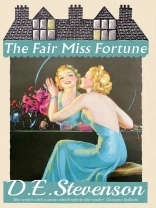‘There’s something . . . I mean we simply must see Miss Fortune now. She isn’t in bed, is she?’
‘No, she ain’t, ‘ said Nannie grimly. ‘She ought to be, but she ain’t, an’ you shall see ‘er. Ho, yes you shall! Both of you shall see ‘er before you’re any older.’
The village of Dingleford is all aquiver with the arrival of lovely young Miss Fortune with plans to open a tea house. Captain Charles Weatherby, just back from India, has ‘no use for bright little creatures no matter how long their eyelashes might be, ‘ but his perspective shifts when they actually meet (much to his mother’s secret delight). The interest of Harold Prestcott, perpetual doormat to a smothering mother, is also piqued, much to her bitter chagrin. And when Miss Fortune’s sister arrives in the village, soon pursued by an irate Frenchman, confusions bloom, passions flare, and hilarity reigns, all in classic D.E. Stevenson style.
The Fair Miss Fortune, written in 1938, was originally (rather bafflingly) rejected by D.E. Stevenson’s publisher. It only finally appeared in print in a limited edition from Greyladies in 2011, and Furrowed Middlebrow and Dean Street Press are delighted to make it more widely available with this new edition. It also includes archival letters between the author and her agent, and an autobiographical sketch by D.E. Stevenson.
‘Miss Stevenson has her own individual and charming way of seeing things.’ Western Mail
Sobre o autor
Born in Edinburgh in 1892, Dorothy Emily Stevenson came from a distinguished Scottish family, her father being David Alan Stevenson, the lighthouse engineer, first cousin to Robert Louis Stevenson.In 1916 she married Major James Reid Peploe (nephew to the artist Samuel Peploe). After the First World War they lived near Glasgow and brought up two sons and a daughter. Dorothy wrote her first novel in the 1920’s, and by the 1930’s was a prolific bestseller, ultimately selling more than seven million books in her career. Among her many bestselling novels was the series featuring the popular ‘Mrs. Tim’, the wife of a British Army officer. The author often returned to Scotland and Scottish themes in her romantic, witty and well-observed novels.During the Second World War Dorothy Stevenson moved with her husband to Moffat in Scotland. It was here that most of her subsequent works were written. D.E. Stevenson died in Moffat in 1973.












